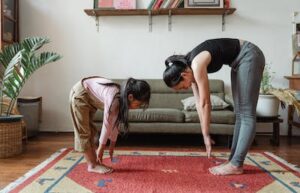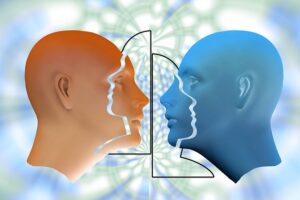Holistic Health: The Ultimate Guide to Prioritizing in Your Daily Routine
1 . Holistic Health Practices
Prioritizing Holistic Health: A Step-by-Step Approach
Holistic health is an approach to life that considers multidimensional aspects of wellness. It encourages individuals to recognize the whole person: physical, mental, emotional, social, intellectual, and spiritual. Rather than focusing solely on physical health, holistic health takes a broader view, aiming to address the root causes of health issues and promote wellness from all angles.

Key Points:
- Comprehensive Wellness: Holistic health recognizes that well-being extends beyond physical health. It encompasses mental, emotional, social, intellectual, and spiritual dimensions. By considering all these aspects, individuals can achieve a more balanced and fulfilling life.
- Active Participation: In the holistic approach, individuals are active participants in their health decisions and healing processes. They make wellness-oriented lifestyle choices, emphasizing prevention and balance.
- Ancient Healing Traditions: Holistic approaches draw from ancient healing traditions. These include practices like acupuncture, meditation, yoga, and herbal remedies. The goal is to achieve higher levels of wellness and prevent disease.
- Integration with Conventional Medicine: Holistic health doesn’t exclude conventional medicine. Instead, it integrates various approaches, including traditional medical systems, mind-body-spirit interventions, and energy therapies, to provide a holistic view of health.
- Wellness-Oriented Activities: Holistic practices involve activities beyond medication. These may include movement, dancing, singing, prayer, mindfulness, and touch. The focus is on promoting overall well-being.
Remember, holistic health emphasizes the interconnectedness of all aspects of our lives, recognizing that true wellness involves more than just physical health².
2 . Holistic Health Practices for Overall Well-being.
- Meditation and Mindfulness: These practices help calm the mind, reduce stress, and promote mental clarity. Regular meditation and mindfulness sessions can enhance emotional balance and overall health.
- Yoga: Yoga combines physical postures (asanas), breathing exercises (pranayama), and meditation. It improves flexibility, strength, and mental focus while promoting relaxation.
- Acupuncture: An ancient Chinese practice, acupuncture involves inserting thin needles into specific points on the body to balance energy (qi) flow. It is used for pain relief, stress reduction, and overall wellness.
- Herbal Medicine: Herbal remedies use plant-based substances to support health. Examples include chamomile tea for relaxation, ginger for digestion, and Echinacea for immune support.
- Ayurveda: An Indian system of medicine, Ayurveda emphasizes balance among the body, mind, and spirit. It includes practices like dietary adjustments, herbal treatments, and lifestyle modifications.
- Energy Healing: Techniques like Reiki, Qi Gong, and Healing Touch focus on restoring energy flow within the body. Practitioners believe that blocked energy contributes to illness.
- Nutrition and Whole Foods: Holistic health emphasizes nourishing the body with whole, natural foods. A balanced diet rich in fruits, vegetables, whole grains, and lean proteins supports overall health.
- Chiropractic Care: Chiropractors use spinal adjustments to improve nervous system function. Proper alignment is believed to enhance overall health and prevent ailments.
- Aromatherapy: Essential oils are used to promote relaxation, reduce stress, and improve mood. Inhaling or applying these oils can have therapeutic effects.
- Emotional Well-Being Practices: These include practices like journaling, art therapy, and spending time in nature. They enhance emotional resilience and self-awareness.
Remember, holistic health encourages a holistic view of well-being, integrating physical, mental, emotional, and spiritual aspects for optimal health and balance.
3 . Holistic Health Practices ;
- Stress Reduction: Holistic practices such as meditation, mindfulness, and yoga help reduce stress levels. By calming the mind and promoting relaxation, they contribute to better mental and physical health.
- Improved Immune Function: A holistic approach that includes nutrition, exercise, and stress management supports a strong immune system. When the body is in balance, it can better defend against illnesses.
- Enhanced Emotional Well-Being: Holistic practices focus on emotional health. Techniques like aromatherapy, art therapy, and journaling help manage emotions, reduce anxiety, and improve mood.
- Better Sleep Quality: Practices like relaxation techniques and sleep hygiene promote restful sleep. Adequate sleep is crucial for overall health and vitality.
- Balanced Energy Flow: Energy-based practices like acupuncture, Reiki, and Qi Gong aim to restore energy flow within the body. When energy is balanced, it positively impacts health.
- Pain Management: Holistic approaches, including chiropractic care and herbal remedies, can alleviate pain and discomfort. They address underlying causes rather than just symptoms.
- Increased Self-Awareness: Practices like yoga and mindfulness enhance self-awareness. Being attuned to your body and emotions allows for better decision-making and self-care.
- Support for Chronic Conditions: Holistic health practices complement conventional medicine. They provide additional support for managing chronic conditions such as diabetes, hypertension, and autoimmune disorders.
- Promotion of Physical Fitness: Holistic approaches encourage movement, exercise, and mind-body practices. Regular physical activity improves cardiovascular health, strength, and flexibility.
- Holistic Beauty: Nourishing the body from within reflects on the outside. A balanced diet, hydration, and stress reduction contribute to healthy skin, hair, and nails.
Remember that holistic health is about integrating all dimensions of wellness to achieve optimal health and vitality. Each person’s journey toward well-being is unique, and finding practices that resonate with you is essential.
4 . Embracing Holistic Health and Beauty: Nurturing Your Body Inside and Out
- Understanding Holistic Health
Holistic health is an approach that considers the whole person, focusing on the mind, body, and spirit. It emphasizes the importance of balance and harmony in all aspects of life to achieve optimal well-being. By addressing underlying causes rather than just symptoms, holistic health aims to treat the root of issues rather than just masking them.
- Nourishing Your Body Naturally
A key aspect of holistic health is the emphasis on natural and whole foods. By consuming a diet rich in fruits, vegetables, whole grains, and lean proteins, you provide your body with the essential nutrients it needs to thrive. Additionally, staying hydrated and avoiding processed foods and excess sugars can help support your overall health and beauty from the inside out.
- The Power of Mind-Body Connection

Mind body soul.
Holistic health also recognizes the interconnectedness of the mind and body. Practices such as meditation, yoga, and deep breathing exercises can help reduce stress levels, improve mental clarity, and promote emotional well-being. By fostering a positive mindset and managing stress effectively, you can enhance your overall health and radiate beauty from within.
- Embracing Natural Beauty Products

When it comes to holistic beauty, opting for natural and organic skincare and beauty products can make a significant difference. By choosing products free from harsh chemicals and artificial ingredients, you can protect your skin from toxins and irritants while nourishing it with beneficial botanicals and antioxidants. This natural approach to beauty can help you achieve a healthy glow while supporting your skin’s long-term health.
- Holistic Treatments for Beauty and Well-Being
In addition to natural skincare products, holistic health and beauty practices encompass a wide range of treatments and therapies. From acupuncture and massage therapy to aromatherapy and herbal remedies, there are numerous holistic approaches to enhance your well-being and beauty naturally. These treatments focus on restoring balance and vitality to your body, promoting overall health and radiance.
- Cultivating a Holistic Lifestyle

Cultivating a Holistic Lifestyle
Embracing a holistic approach to health and beauty is not just about individual practices but rather a lifestyle that prioritizes self-care, mindfulness, and overall well-being. By incorporating holistic principles into your daily routine, you can cultivate a sense of balance, vitality, and beauty that emanates from within. Whether through nourishing foods, mindful practices, or natural treatments, holistic health and beauty offer a path to holistic wellness and lasting radiance.
Holistic health and beauty go hand in hand, offering a comprehensive approach to nurturing your body inside and out. By embracing natural practices, nourishing your body with wholesome foods, and prioritizing self-care and mindfulness, you can achieve a state of balance, vitality, and beauty that shines from within. Embrace the holistic approach to health and beauty and unlock the transformative power of nurturing your body, mind, and spirit in harmony.
5 . The Timeline for Results Depends on Several Factors.
- Individual Variation: Each person’s body and mind respond differently to holistic practices. Some individuals may notice changes sooner, while others might take longer.
- Consistency: Consistent practice is essential. Short-term benefits like reduced stress or improved mood may be noticeable within days or weeks. However, long-term benefits often require sustained effort over months or years.
- Type of Practice: The specific holistic practice matters. For example:
- Meditation: Some people feel calmer after just a few sessions, but long-term benefits (such as improved focus and emotional resilience) develop over time.
- Yoga: Physical flexibility and relaxation may be felt after a few classes, but deeper effects on overall well-being emerge with regular practice.
- Herbal Remedies: Immediate effects (like relaxation from chamomile tea) can be noticed, but consistent use yields better results.
- Health Condition: If you’re addressing a specific health issue (e.g., chronic pain, anxiety, insomnia), results may vary. Some conditions improve gradually, while others may require patience.
- Lifestyle Factors: Holistic practices work synergistically with lifestyle choices. Factors like nutrition, sleep, physical activity, and stress management impact the timeline.
- Mindset and Expectations: Having realistic expectations is crucial. Holistic health isn’t a quick fix; it’s a journey. Be open-minded and patient.
In summary, while short-term benefits can be seen relatively quickly, long-lasting transformation through holistic practices often requires dedication and time. Trust the process, stay committed, and observe how your well-being evolves over weeks and months.
6. Be Aware of Potential Risks, Some Considerations:
- Lack of Scientific Evidence: Some holistic practices lack rigorous scientific evidence to support their effectiveness. While anecdotal reports exist, not all modalities have undergone extensive clinical trials.
- Delayed Medical Treatment: Relying solely on holistic methods without seeking conventional medical care can lead to delayed diagnosis and treatment. Holistic practices should complement, not replace, medical advice.
- Individual Variation: What works for one person may not work for another. Holistic practices are highly individualized, and results can vary based on factors like genetics, lifestyle, and mindset.
- Interaction with Medications: Herbal remedies, supplements, and alternative therapies can interact with prescribed medications. Always consult a healthcare professional before combining treatments.
- Unqualified Practitioners: Seek practitioners with proper credentials and training. Unqualified individuals may offer ineffective or unsafe treatments.
- Overreliance on Self-Diagnosis: While self-awareness is crucial, assuming you can diagnose and treat serious conditions solely through holistic practices can be risky. Regular medical check-ups are essential.
- Financial Costs: Some holistic treatments can be expensive, especially if they are not covered by insurance. Consider the financial impact before committing to long-term practices.
- Psychological Risks: Practices like meditation or energy healing can sometimes trigger emotional responses. Ensure you’re emotionally prepared and seek professional guidance if needed.
- Cultural Appropriation: Be respectful of the cultural origins of holistic practices. Appropriating traditions without understanding their context can be harmful.
- Placebo Effect: While the placebo effect can be positive, it can also lead to false perceptions of improvement. Be discerning about genuine progress versus perceived benefits.
Remember that informed decision-making involves weighing both benefits and risks. Consult with healthcare professionals, research thoroughly, and choose holistic practices that align with your overall health goals.
7 . Children can Indeed Benefit, Ways Practices can Positively impact their well-being:
- Mindfulness and Relaxation: Teaching children mindfulness techniques, such as deep breathing or simple meditation, helps them manage stress, improve focus, and regulate emotions.
- Yoga for Kids: Kid-friendly yoga classes promote physical flexibility, balance, and relaxation. Yoga also encourages body awareness and self-acceptance.
- Nutrition Education: Holistic health emphasizes whole foods and balanced nutrition. Teaching children about healthy eating habits sets a foundation for lifelong wellness.
- Outdoor Time: Spending time in nature is essential for children’s overall health. It boosts creativity, reduces anxiety, and encourages physical activity.
- Emotional Expression: Holistic practices like art therapy or journaling allow children to express their emotions safely and creatively.
- Herbal Remedies: Some gentle herbal remedies can benefit children. For example, chamomile tea may help with relaxation and sleep.
- Positive Affirmations: Encouraging positive self-talk and affirmations builds resilience and self-esteem.
- Energy Awareness: While children may not fully grasp concepts like energy flow, practices like Reiki or gentle touch can promote a sense of comfort and well-being.
- Play and Movement: Holistic health encourages play, movement, and dance. These activities enhance physical fitness and joy.
- Family Bonding: These practices often involve family participation. Shared activities like cooking nutritious meals or practicing mindfulness strengthen family bonds.
Children’s practices should be age-appropriate, enjoyable, and adapted to their developmental stage. Always involve parents or guardians in decisions related to their well-being.
8 . For children, be Aware of Potential Risks. Important points to consider:
- Lack of Scientific Evidence: Some holistic practices lack robust scientific evidence regarding their safety and efficacy in children. While anecdotal reports exist, not all modalities have undergone rigorous clinical trials specifically for pediatric populations.
- Individual Variation: Children’s responses to holistic practices can vary widely. What works well for one child may not be suitable for another. Factors like age, developmental stage, and overall health play a role.
- Delayed Medical Attention: Relying solely on holistic methods without seeking conventional medical care can lead to delayed diagnosis and treatment. Holistic practices should complement, not replace, medical advice.
- Interaction with Medications: Certain herbal remedies, supplements, or alternative therapies may interact with prescribed medications. Always consult a healthcare professional before combining treatments.
- Unqualified Practitioners: Ensure that practitioners working with children have proper credentials and training. Unqualified individuals may offer ineffective or unsafe treatments.
- Overreliance on Self-Diagnosis: While self-awareness is valuable, assuming you can diagnose and treat serious conditions solely through holistic practices can be risky. Regular medical check-ups are crucial.
- Psychological Risks: Practices like meditation or energy healing can sometimes trigger emotional responses in children. Ensure they are emotionally prepared and provide appropriate support.
- Cultural Appropriation: Be respectful of the cultural origins of holistic practices. Appropriating traditions without understanding their context can be harmful.
- Parental Involvement: Parents or guardians should actively participate in decisions related to their child’s holistic health. Open communication is vital.
- Placebo Effect: While the placebo effect can be positive, it can also lead to false perceptions of improvement. Be discerning about genuine progress versus perceived benefits.
9 . Some Common Misconceptions;
- Holistic Health Is Only About Alternative Medicine: One of the biggest misconceptions is that holistic health is synonymous with alternative or complementary medicine. While holistic practices include these modalities, they also encompass lifestyle choices, emotional well-being, and social connections.
- Holistic Approaches Are All ‘Natural’ and Safe: While many holistic practices emphasize natural remedies, not all are risk-free. Some herbal supplements, for instance, can interact with medications or cause adverse effects. Safety and evidence should always be considered.
- Holistic Means Rejecting Conventional Medicine: Holistic health doesn’t advocate rejecting conventional medicine. Instead, it encourages integration. Holistic practitioners often collaborate with medical professionals to provide comprehensive care.
- Holistic Practices Are Universal: Holistic approaches vary across cultures and individuals. What works for one person may not work for another. It’s a personalized journey, not a one-size-fits-all solution.
- Holistic Health Is Only for New Age Believers: Holistic practices have ancient roots in various traditions (such as Ayurveda, Traditional Chinese Medicine, and Native American healing). They aren’t limited to New Age spirituality.
- Holistic Means Ignoring Science: Holistic health values scientific evidence. It seeks to understand the whole person beyond physical symptoms. Integrating science and holistic principles leads to better outcomes.
- Holistic Practices Are Expensive: While some holistic treatments can be costly, others are accessible and affordable. Holistic health emphasizes prevention, which can save money in the long run.
- Holistic Approaches Are Slow: While long-lasting change takes time, some holistic practices offer immediate benefits. For example, deep breathing instantly reduces stress.
- Holistic Health Is Only about Individual Wellness: Holistic health extends beyond the individual. It considers community, environment, and interconnectedness. Social well-being matters too.
- Holistic Practices Are All ‘Alternative: Some holistic practices (like exercise, nutrition, and stress management) are mainstream and evidence-based. They’re not always alternatives.
10 . Holistic Health a Comprehensive Approach to Well-being by Considering the Mind, Body, and Spirit and its Limitations;
Benefits of Holistic Health:
- Empowerment: Holistic health empowers individuals to take an active role in their well-being. It emphasizes self-care, stress reduction, and healthy lifestyle choices.
- Comprehensive Approach: By addressing physical, mental, emotional, and spiritual aspects, holistic health promotes balance and harmony in all areas of life.
- Positive Mindset: It encourages a proactive approach to achieve optimal health and preventing illnesses⁴.
- Greater Sense of Control: Individuals gain a sense of control over their health by making informed choices⁴.
Limitations of Relying Solely on Holistic Practices:
- Lack of Scientific Evidence: Some holistic practices lack rigorous scientific evidence. It’s essential to balance holistic approaches with evidence-based medicine.
- Delayed Medical Attention: Relying exclusively on holistic methods may delay the diagnosis and treatment of serious conditions. Conventional medical care remains crucial.
- Individual Variation: Responses to holistic practices vary. What works for one person may not work for another.
- Interaction with Medications: Herbal remedies and supplements can interact with prescribed drugs. Consult a healthcare professional.
- Overreliance on Self-Diagnosis: While self-awareness is valuable, professional medical assessments are necessary for accurate diagnoses.
In summary, holistic health complements conventional medicine and encourages a holistic view of well-being. Integrating both approaches provides a balanced and comprehensive approach to health and healing.
Remember that informed decision-making involves weighing both benefits and risks. Consult with healthcare professionals, research thoroughly, and choose holistic practices that align with your child’s unique needs and overall health goals.
Source
(1) What is Holistic Health? – Institute for Holistic Health Studies. https://www.wcsu.edu/ihhs/what-is-holistic-health/.
(2) What is holistic health and how does it differ from traditional medicine?. https://microsoftstart.msn.com/…/in-generalhealth….
(3) What Is Holistic Health? Overview and Career Outcomes. https://www.stkate.edu/healthcare…/what-is-holistic-health.
(4) What Is Holistic Health? • Holistic Council. https://holisticcouncil.org/what-is-holistic-health/.
(5) Undefined. https://microsoftstart.msn.com/.



